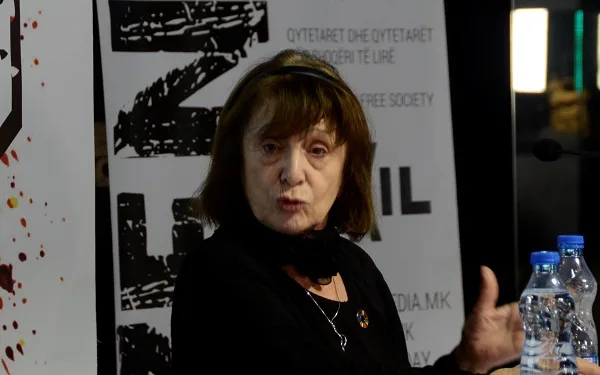Activist Savka Todorovska, one of the veterans of the civil sector, at the Conference “Between Hopes and Reality”, (on 29 November 2019, dedicated to the successes, problems and perspectives of the NGO sector, and at the occasion of celebrating CIVIL’s 20th anniversary), spoke about the role of women in the civil sector, the position of women’s organizations in the Macedonian society and about cooperation with the organization.
“Everyone is talking about 20 years, and I am able to talk about almost 30 years. As much as our country exist independently. And with the first organization of civil society organizations, not knowing what actually we are supposed to be doing, we organized the local women’s organization to be a model for other local ones throughout the country and in 1994 we created already the first network.
For me, it is really a challenge that there are no donations to the women’s movement. It’s clear to me, but I don’t know if it’s clear to the other, because we have the biggest results. We have come from only 4 women in Parliament to a 45. From the letter v in violence, we have laws, ratified convention, law on domestic violence, free legal assistance…
Or you will be an activist and be known and recognizable for that, and will not receive money and will continue with the activism. This simply is not an obstacle for us. But that is why 150 women have come out from our part that have high positions and contribute also to the civil sector, contribute to the government as well and to ministries and everywhere else, because they have truly built themselves and had where to do that and why.
CIVIL is the first and only that does not forget to say “citizeness and citizens”. The stereotypes in Macedonia with the setting of cross cutting… I don’t know whether that is civil. 50 % are women in the country. We live in a real world. We understand the essence, we know it and that is how we act. And that is why from only one organization in 1991 today we have 201. And we participate everywhere with all activities, because we believe it is our duty.
We are not saying gender equality, because the organization after the membership in the World Council of Women became the National Council of Union of Women’s Organizations in Macedonia. Not because we don’t support women, but because they still need support due to stereotypes. There are still some women who don’t want to and don’t know, especially from the rural areas, but can do a lot.
I am sure you know the fact that there are 10% more women in higher education than the male population. This means that we capacity. We have them in Parliament 50:50, but not enough in the structures of government. We are not saying that all of them have to, but those who want to and can, who know how, who show capacity. I don’t even want to talk about all the crises in the country. There isn’t a crisis that has not passed through us. There isn’t a crisis in which we have not been direct participants or leaders in dealing with that crisis. Humanitarian aid and all activities. Those are the women in our country. And when once in one occasion, after independence, I met an activist from Croatia and she asked me if we had projects, I was ashamed. I came from mines and ironworks, I knew about projects on roads, factories, railway. I simply said nothing as if I hadn’t heard her.
This means we were building ourselves, through our work and through our active participation. That is why I congratulate Xhabir and CIVIL, and especially him because the organization is surely what he is. Because he never forgets that women are equal stakeholders in our society.
We will continue to be as such, regardless of our years. As long as they know and want the female activists to be on the ground, to work, to know what they are doing. Without our activism, there is no civil sector. Only the government can be elitist, the business sector, but activism without activists who can implement that on the ground does not exist. I think that our organization still exists as such and we are at the disposal of everyone who wants and can, there is no one we have not joined.
Translation: N. Cvetkovska















